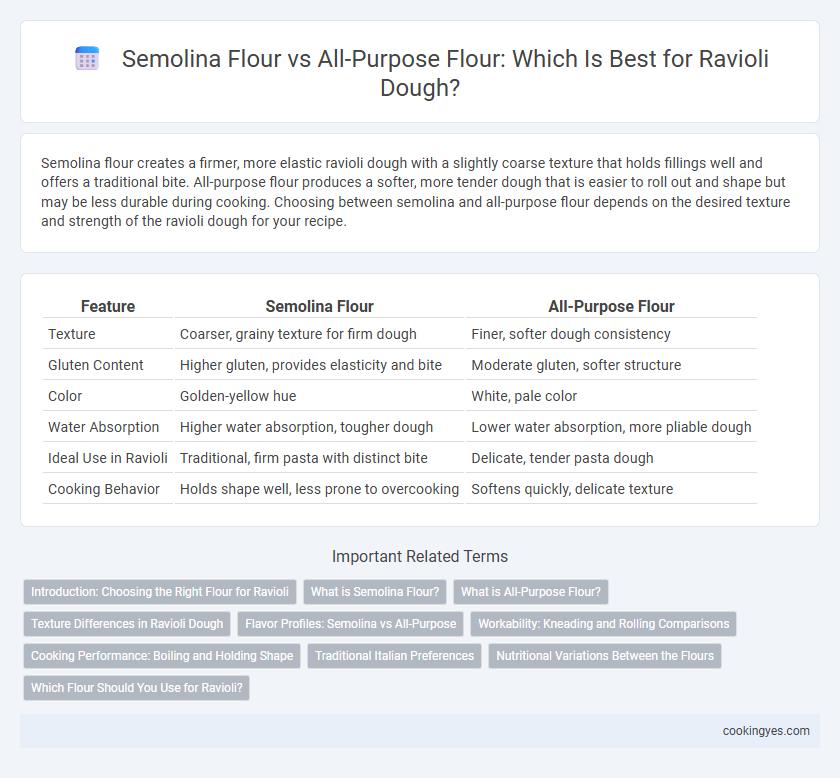Semolina flour creates a firmer, more elastic ravioli dough with a slightly coarse texture that holds fillings well and offers a traditional bite. All-purpose flour produces a softer, more tender dough that is easier to roll out and shape but may be less durable during cooking. Choosing between semolina and all-purpose flour depends on the desired texture and strength of the ravioli dough for your recipe.
Table of Comparison
| Feature | Semolina Flour | All-Purpose Flour |
|---|---|---|
| Texture | Coarser, grainy texture for firm dough | Finer, softer dough consistency |
| Gluten Content | Higher gluten, provides elasticity and bite | Moderate gluten, softer structure |
| Color | Golden-yellow hue | White, pale color |
| Water Absorption | Higher water absorption, tougher dough | Lower water absorption, more pliable dough |
| Ideal Use in Ravioli | Traditional, firm pasta with distinct bite | Delicate, tender pasta dough |
| Cooking Behavior | Holds shape well, less prone to overcooking | Softens quickly, delicate texture |
Introduction: Choosing the Right Flour for Ravioli
Semolina flour, made from durum wheat, provides a coarse texture and higher protein content that results in a firm and elastic ravioli dough, enhancing its ability to hold fillings without tearing. All-purpose flour offers a softer, more pliable dough due to its lower protein content, making it easier to work with but potentially less robust during cooking. Selecting between semolina and all-purpose flour depends on whether you prioritize a traditional, chewy texture or a tender, delicate finish for your ravioli.
What is Semolina Flour?
Semolina flour, derived from durum wheat, is a coarse-textured flour often used in traditional ravioli dough for its high gluten content and firm bite. Unlike all-purpose flour, semolina provides a slightly grainy texture and golden color, enhancing the pasta's structure and ability to hold fillings without becoming soggy. Its unique protein composition results in a dough that is both elastic and resilient, ideal for creating delicate yet sturdy ravioli.
What is All-Purpose Flour?
All-purpose flour is a versatile, finely milled wheat flour commonly used in a wide range of baking and cooking recipes, including pasta like ravioli dough. It contains a moderate protein content, typically around 10-12%, which provides a good balance of gluten development for elasticity and tenderness in the dough. Compared to semolina flour, all-purpose flour produces a smoother texture, making it ideal for tender ravioli with a delicate bite.
Texture Differences in Ravioli Dough
Semolina flour produces a ravioli dough with a coarser, grainier texture that gives the pasta a firm bite and better structure, ideal for holding fillings without tearing. All-purpose flour results in a softer, smoother dough that is more pliable and easier to roll out, but may lack the chewiness and resilience provided by semolina. Choosing semolina flour enhances the textural contrast between the dough and filling, creating a more traditional, robust ravioli experience.
Flavor Profiles: Semolina vs All-Purpose
Semolina flour imparts a nutty, slightly sweet flavor to ravioli dough, enhancing the overall taste and providing a rustic, hearty character. All-purpose flour produces a milder, more neutral flavor that allows fillings to take center stage without competing with the dough's taste. Choosing semolina over all-purpose flour results in a more robust, textured bite that complements rich or savory fillings in traditional Italian recipes.
Workability: Kneading and Rolling Comparisons
Semolina flour offers a coarser texture that enhances dough elasticity, making it easier to knead and roll for ravioli with a firm bite. All-purpose flour produces a softer dough that is more pliable, allowing for smoother rolling and easier shaping but may lack the structural strength needed for thin pasta sheets. Using semolina flour improves dough durability during handling, while all-purpose flour provides a tender finish, balancing workability with texture in ravioli preparation.
Cooking Performance: Boiling and Holding Shape
Semolina flour's coarse texture and high protein content enhance ravioli dough's firmness, allowing it to withstand boiling without becoming mushy, which preserves the pasta's al dente texture. All-purpose flour results in a softer dough that can absorb more water, making the ravioli prone to swelling and losing shape during cooking. Using semolina flour improves the pasta's durability in boiling water, maintaining distinct contours and preventing tearing.
Traditional Italian Preferences
Traditional Italian ravioli dough often favors semolina flour for its coarse texture and higher protein content, which provides a firm yet tender bite perfect for holding fillings. Semolina contributes a slightly nutty flavor and a distinctive yellow hue, enhancing the authenticity of regional recipes. While all-purpose flour creates a softer dough, it lacks the elasticity and durability that semolina offers, making semolina the preferred choice among Italian pasta artisans.
Nutritional Variations Between the Flours
Semolina flour, derived from durum wheat, contains higher protein and gluten levels compared to all-purpose flour, contributing to a firmer and more elastic ravioli dough. Nutritionally, semolina offers increased amounts of iron, magnesium, and B vitamins, enhancing the dough's micronutrient profile. In contrast, all-purpose flour, made from a blend of hard and soft wheat, has a lower protein content and fewer minerals, resulting in a softer texture but less nutritional density.
Which Flour Should You Use for Ravioli?
Semolina flour, made from durum wheat, offers a coarser texture and higher protein content, resulting in a firm and slightly chewy ravioli dough that holds up well during cooking. All-purpose flour produces a softer, more elastic dough which is easier to roll out and shape, ideal for delicate fillings. Choose semolina for traditional, robust ravioli texture and all-purpose flour for a tender, pliable dough perfect for refined pasta creations.
Semolina flour vs All-purpose flour for ravioli dough Infographic

 cookingyes.com
cookingyes.com